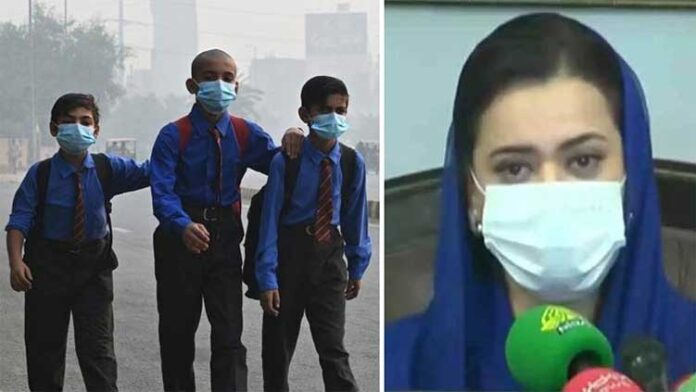LAHORE (Bakhabar Pakistan) – On Wednesday, the Punjab government announced the temporary closure of educational institutions, including primary, secondary, and higher secondary schools, in response to the worsening smog situation. This directive affects four major divisions: Lahore, Gujranwala, Faisalabad, and Multan. The closure will last from November 7 to November 17, with the aim of protecting the health and safety of students and staff.
According to an official notification from the education department, both public and private schools in 18 districts, such as Lahore, Sheikhupura, Kasur, Nankana Sahib, Gujranwala, Gujrat, Hafizabad, Mandi Bahauddin, Sialkot, Narowal, Faisalabad, Chiniot, Jhang, Toba Tek Singh, Multan, Lodhran, Vehari, and Khanewal, will be impacted. Educational activities for students up to grade 12 and A-level will shift online to ensure minimal disruption to learning during this period.
Senior Minister Marriyum Aurangzeb, in a press conference alongside Health Minister Imran Nazir, provided further insight into the factors contributing to the current air quality crisis. She attributed the severe smog conditions to cross-border pollution, noting that smoke from stubble burning in India had drifted into Pakistan due to wind patterns. This influx of smoke has significantly polluted the air, particularly in the eastern and central parts of Punjab.
The minister explained that, while primary schools were initially closed as a precautionary measure, the severity of the smog has now necessitated the closure of all educational institutions up to higher secondary levels in the affected regions. “We are committed to protecting the health of our children and ensuring they are not exposed to harmful conditions,” Aurangzeb stated.
She emphasized that, under the direction of the Punjab chief minister, various preventative measures have been implemented to mitigate the smog crisis. These measures include a strict ban on smoke-emitting vehicles and the temporary closure of brick kilns, which are significant contributors to air pollution. Additionally, the government has launched awareness campaigns aimed at the agriculture and industrial sectors to encourage practices that reduce smog formation, such as responsible crop residue disposal and industrial emission control.
The health repercussions of the smog are already evident. Marriyum Aurangzeb reported that over 900 individuals visited hospitals in Lahore alone on Tuesday, seeking medical assistance for respiratory and other health issues directly related to the polluted air. She advised residents to take precautions, including staying indoors whenever possible and wearing protective masks when venturing outside to reduce exposure to harmful air pollutants.
Adding to her remarks, the health minister provided an alarming update on the air quality index (AQI) of Lahore. As of Wednesday morning, Lahore’s AQI was recorded at an unprecedented level of around 1,100, indicating “hazardous” air quality. Such levels pose significant health risks to all individuals, particularly those with pre-existing respiratory conditions, children, and the elderly.
The government’s response aims to balance immediate health concerns with long-term preventive strategies. The senior minister reiterated the importance of public cooperation, urging residents to adhere to safety guidelines and prioritize their well-being during this critical period. “We strongly advise people to stay indoors and only go out when absolutely necessary. When stepping outside, wearing a mask is essential for protecting oneself from the harmful effects of smog,” Aurangzeb cautioned.
In addition to the temporary school closures and restrictions on polluting industries, the government is also working on medium- to long-term solutions. These include stricter enforcement of environmental regulations, enhancing green spaces in urban areas, and promoting cleaner fuel alternatives. The goal is to not only address the immediate smog crisis but to create sustainable improvements in air quality across Punjab in the future.
The health department is also collaborating with hospitals to ensure that facilities are equipped to handle the influx of patients experiencing respiratory and other health issues due to the deteriorating air quality. Public health advisories will continue to be issued, and further measures may be taken as the situation evolves.
In conclusion, the Punjab government’s decision to close schools and shift to online learning reflects a proactive stance in safeguarding public health amid an unprecedented smog crisis. The combination of preventative and educational measures underscores the administration’s commitment to protecting the wellbeing of its residents while working towards long-term solutions to prevent similar crises in the future.


